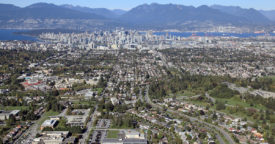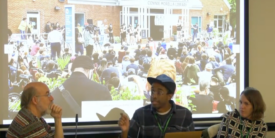Anna:
As we pause to consider the anniversary of the BP oil spill in the Gulf of Mexico, here’s some food for thought (or ire) brought to you by ThinkProgress at the Center for American Progress Action Fund: “After writing off the losses incurred from the tragedy they created, BP received nearly a $10 billion dollar credit on their 2010 federal tax return—compare that to the EPA’s annual budget of $10.5 billion in 2010.”
Eric dP:
Like everyone else in Seattle who’s been swept into the all-consuming Vortex of Tunnel Politics (VTP), I’ve been following the fallout from the Nelson/Nygaard report that analyzes traffic diversion resulting from tolls planned for tunnel. I especially appreciated the coverage by Cienna Madrid at The Stranger, Scott Gutierrez at the Seattle P-I, Adam Parast at Seattle Transit Blog, and Erica Barnett at Publicola. Okay, that’s enough VTP for now.
This weekend, take a gander at a pair of newspaper pieces that link traditional environmental issues to social justice and economic equity concerns. Craig Welch checks up on Duwamish River clean up efforts in the Seattle Times. And California governor Arnold Schwartzenegger defends the Clean Air Act in a Wall Street Journal op-ed:
Since January, there have been more than a dozen proposals in Congress to limit enforcement of our clean-air rules, create special-interest loopholes, and attempt to reverse scientific findings… This is not an abstract political fight. If these proposals are passed, more mercury, dioxins, carbon pollution and acid gases will end up in the air our kids breathe. More Americans will get sick, end up in the hospital, and die from respiratory illness. We would be turning our backs on the sound science and medical advice that has reduced air pollution…
By sheer coincidence, Arnold’s piece published on April 12, 2011. That is a coincidence, right?
Lastly, and purely for the snark value, I enjoyed Matthew Stewart’s “The Management Myth” at the Atlantic. Like me, Stewart is a fugitive from academic philosophy, which gave his take-down of “management theory” an extra dose of relevance.
Clark:
Short and sweet this week. Referee hand signals for philosophical arguments.
The Science of Why We Don’t Believe Science.
Alan
First, favorite fact of the week: Yes, it has been a horrible Spring in the Northwest, with fewer nice days than in any other spring on record. That’s according to Washington climatologist Cliff Mass.
It was a big reading week for me, but I’ll limit myself to a trio of articles. Alyssa Katz has a fascinating piece on home ownership, and housing policy generally, in The American Prospect. It covers programs that try to somehow reconcile the contradiction of places of residence that are both speculative investments and homes.
Democracy: A Journal of Ideas has a Spring 2011 edition that’s all worth reading. The best of its several highlights, in my view, is Matthew Yglesias’ “Fed Up,” which addresses governance reform at the Federal Reserve. It sounds arcane, but it’s essential; it opened my eyes on the subject.
Nicholson Baker, meanwhile, has contributed an essay to Harper’s that challenges much that I’ve thought about World War II. “Why I’m a Pacifist” argues war never works and it does so by making a defensible case that pacifists were right even in the more just of all wars, World War II. I would not say it changed my mind, but it sure made me think anew (subscription required).
When you’re tired of reading, I strongly recommend watching Sightline board member Mark Trahant’s exceptional Frontline contribution on PBS about sexual abuse of Alaska Native children by Catholic priests in the 1960s and 1970s. It’s a compelling and compassionate half hour of television. The full program is available online.
To salve the pain of watching that program and perhaps revive your sense of cosmic gratitude, try this short video: an extraordinary set of time lapse images from a mountain in Spain.
Eric H
For the $4.2 billion price tag on the deep bore tunnel, etc. project, you could buy 42 AT-AT Imperial Walkers. They’d stretch half a mile end-to-end (at least twice that while moving), and be impervious to snow.








